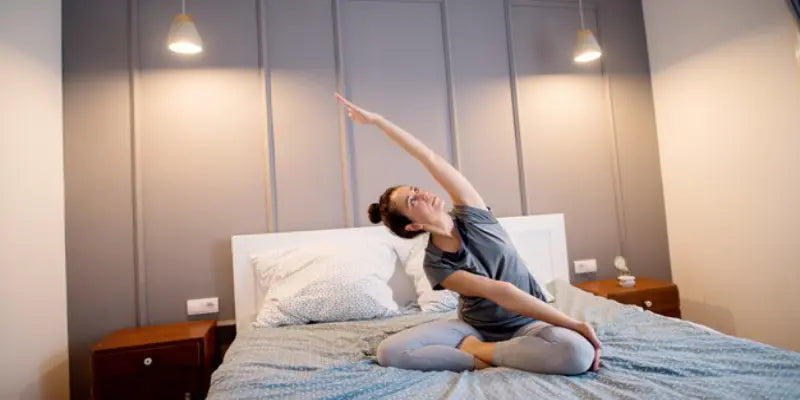
Role of Exercise in Improving Sleep Quality
If you are having sleep problems for a long time, the best thing you can do to solve this problem is exercise regularly. It keeps you fit, lowers your risk of disease, and can improve your sleep quality. Physical activity can make you feel tired, but it also helps you sleep better at night, and better sleep can have a good impact on both your physical and mental health.
In this blog, we’ll learn more about how exercise improves your sleep quality and when and how much to exercise to do to get better sleep.
How Exercise Affects Sleep
Maintaining a healthy body and mind requires regular physical activity. It can improve your mood, reduce anxiety and sadness, help you maintain a healthy weight, and minimize your chance of acquiring several diseases. Similarly, consistent, high-quality sleep provides all of the same benefits.
Improves Sleep Quality
When you do intense workouts, it expends so much of your energy. You’ll feel more tired and fatigued and you’ll sleep faster at night. When you exercise consistently, you can fall asleep quicker and get the sleep your body needs. If you exercise daily, you are likely to spend more time in deep sleep.
Relieves Stress
When you are stressed your body releases more cortisol than necessary. Cortisol is a stress hormone that affects the duration and quality of sleep. The more high intensity workout you do the less will be the production of cortisol so you’ll sleep better and for longer duration. Exercise helps you relieve stress so you sleep better at night.
Better Sleep Wake Cycle
If you do outdoor workouts you get natural light, which helps your body establish a good sleep-wake cycle. It tells your body when to be alert and when to wind down. Also if it is not possible for you to do outdoor workouts, exercise in one way or another helps you sleep better.
Relieve Sleep Disorder Symptoms
Regular exercise can help treat a number of sleep disorders, including Obstructive Sleep Apnea (OSA), Restless Leg Syndrome (RLS), and insomnia. Maintain a regular exercise routine before using any sleep medication. Cognitive Behavioral Therapy commonly includes daytime exercise with sleep hygiene behaviors.
How Much Exercise is Required to Get Better Sleep?
For you to notice improvements in the quality of your sleep, you should exercise for at least 30 minutes a day, at a moderate to high intensity. Recommendations allow people to engage in two days of muscle-strengthening exercise and 150 minutes of moderate-intensity physical activity each week for the long-term advantages of sleep health. If 30 minutes a day of exercise seems too much, consider dividing your workouts into shorter periods of time.
Best Time of Day to Work Out
Other than two to three hours before bed, you can work out whenever you choose during the day. High-intensity workouts should be avoided right before bed because they raise body temperature and heart rate. Your body's temperature and heart rate require some time to normalize, which delays the onset of sleep.
Exercise outside first thing in the morning to get the most out of your training. By doing this, you can benefit from both the health advantages of exercise and the benefits of morning sunlight to help you maintain a regular sleep-wake cycle.
Is Exercising at Night Bad for Sleep?
Exercising at night is not recommended because it raises your core body temperature, which must drop before you can sleep. This is one of the reasons why many people think exercise is a bad idea before bedtime.
Walking, riding, and yoga are all options for nighttime exercise. Save high-intensity workouts until the morning or early afternoon. Also, make sure you finish your workout at least an hour before bedtime. Some people can tolerate a strenuous workout in the evening and still sleep well, whilst others cannot. You may not know for certain unless you try it.
Conclusion
Sleep is important for maintaining good health. Sleep problems and stress are just a few of the things that might influence how well you sleep. Regular exercise is one strategy to improve your sleep quality.
There is no appropriate time to exercise. It doesn't matter if you workout in the morning, noon, or evening. Instead, aim for at least 30 minutes of physical activity per day in a way that makes you feel good.
If you are having difficulty falling asleep, investing in a bamboo pillow is another thing you can do to improve your sleep quality. The inside of the bamboo pillow is made of memory foam, which has the added benefit of adjusting to the shape of your neck and head, allowing you to sleep with better posture.
Also, the bamboo cover is hypoallergenic, making it an excellent choice for anyone with sensitive skin or allergies. Its breathability keeps the pillow cool all night, allowing comfortable and peaceful sleep.








